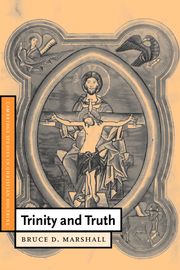Book contents
- Frontmatter
- Contents
- Preface
- A note on translations
- 1 Introduction: theology and truth
- 2 The triune God as the center of Christian belief
- 3 Epistemic justification in modern theology
- 4 Problems about justification
- 5 The epistemic primacy of belief in the Trinity
- 6 Epistemic priorities and alien claims
- 7 The epistemic role of the Spirit
- 8 The concept of truth
- 9 Trinity, truth, and belief
- Index
1 - Introduction: theology and truth
Published online by Cambridge University Press: 23 December 2009
- Frontmatter
- Contents
- Preface
- A note on translations
- 1 Introduction: theology and truth
- 2 The triune God as the center of Christian belief
- 3 Epistemic justification in modern theology
- 4 Problems about justification
- 5 The epistemic primacy of belief in the Trinity
- 6 Epistemic priorities and alien claims
- 7 The epistemic role of the Spirit
- 8 The concept of truth
- 9 Trinity, truth, and belief
- Index
Summary
Truth as a theological problem
Recall for a moment Jesus' confrontation with Pontius Pilate. As the Gospel of John depicts the scene – in striking contrast to the version shared by Matthew, Mark, and Luke – Jesus engages in an argument with Pilate on kingship and truth. The debate takes a form well known to philosophers ancient and modern; it is an exercise in conceptual clarification. Pilate begins by asking Jesus if he is “the King of the Jews” (18:33). Jesus responds by ascribing to himself a sort of kingship which, while not fully defined by him, is “not from this world” (18:36). Whatever else it involves, this sort of kingship entails that its possessor will not fight to preserve his own life (18:36). Pilate finds this puzzling: “So are you a king?” he asks Jesus (18:37). He appears not to be sure that a plausible concept of kingship can embrace such notions as unworldliness and non-violence. Jesus responds: “You say that I am a king. For this I was born, and for this I have come into the world, to bear witness to the truth. Everyone who is of the truth hears my voice” (18:37). Talk of a sort of kingship which involves not only non-violence but a public commitment to truth only adds to Pilate's confusion. “What is truth?” he asks (18:38). There the debate ends.
Some interpreters of this exchange between Jesus and Pilate (Friedrich Nietzsche, for one) have seen Pilate as the clear winner of the debate, the hero of the story.
- Type
- Chapter
- Information
- Trinity and Truth , pp. 1 - 16Publisher: Cambridge University PressPrint publication year: 1999

